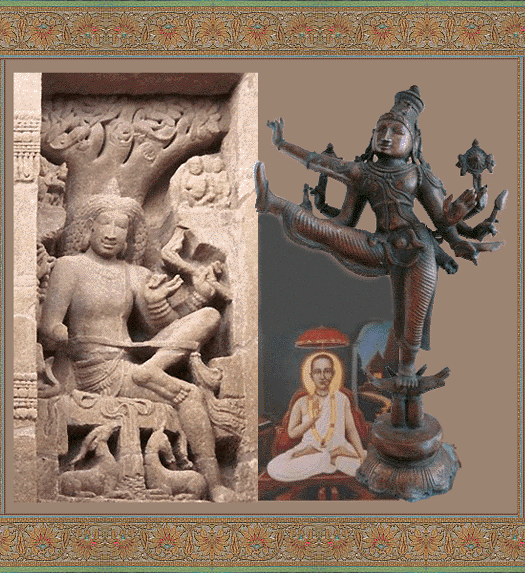

"Lord Siva is described here as caracara-guru, the spiritual master of all animate and inanimate objects. He is sometimes known as Bhutanatha, which means "the worshipable deity of the dull-headed." Bhuta is also sometimes taken to indicate the ghosts. Lord Siva takes charge of reforming persons who are ghosts and demons, not to speak of others, who are godly; therefore he is the spiritual master of everyone, both the dull and demoniac and the highly learned Vaisnavas. It is also stated, vaisnavanam yatha sambhuh: Sambhu, Lord Siva, is the greatest of all Vaisnavas. On one hand he is the worshipable object of the dull demons, and on the other he is the best of all Vaisnavas, or devotees, and he has a sampradaya called the Rudra-sampradaya."
Srimad-Bhagavatam 4:2:2
"Lord Siva is known as the greatest devotee of the Supreme Personality of Godhead. He is known as the best of all types of Vaisnavas (vaisnavanam yatha sambhuh). Consequently, Lord Siva has a Vaisnava sampradaya, the disciplic succession known as the Rudra-sampradaya. Just as there is a Brahma-sampradaya coming directly from Lord Brahma, the Rudra-sampradaya comes directly from Lord Siva. Lord Siva is one of the twelve great personalities, as stated in Srimad-Bhagavatam (6.3.20):
svayambhur naradah sambhuh"These are twelve great authorities in preaching God consciousness. The name Sambhu means Lord Siva. His disciplic succession is also known as the Visnusvami-sampradaya, and the current Visnusvami-sampradaya is also known as the Vallabha-sampradaya. The current Brahma-sampradaya is known as the Madhva-Gaudiya-sampradaya. Even though Lord Siva appeared to preach Mayavada philosophy, at the end of his pastime in the form of Sankaracarya, he preached the Vaisnava philosophy: bhaja govindam bhaja govindam bhaja govindam mudha-mate. He stressed worshiping Lord Krsna, or Govinda, three times in this verse and especially warned his followers that they could not possibly achieve deliverance, or mukti, simply by word jugglery and grammatical puzzles. If one is actually serious to attain mukti, he must worship Lord Krsna. That is Sripada Sankaracarya's last instruction."
kumarah kapilo manuh
prahlado janako bhismo
balir vaiyasakir vayam
"It is especially significant that Lord Siva is a pure devotee of Lord Vasudeva. Vaisnavanam yatha sambhuh: "Amongst all Vaisnavas, Lord Siva is the topmost." Consequently Lord Siva has a sampradaya, a Vaisnava disciplic succession, called the Rudra-sampradaya. At the present moment those who belong to the Visnusvami-sampradaya of Vaisnavas come from Rudra, Lord Siva. To become a devotee of Lord Krsna, Vasudeva, is very, very difficult. The word especially used in this connection is duraradhyam. The worship of the demigods is not very difficult, but becoming a devotee of Lord Vasudeva, Krsna, is not so easy. However, if one adheres to the principles and follows in the footsteps of the higher authorities, as advised by Lord Siva, one can easily become a devotee of Lord Vasudeva."
Srimad-Bhagavatam 4:24:76
![[BVML Home Page]](../../grfx/bml_logo.gif)
